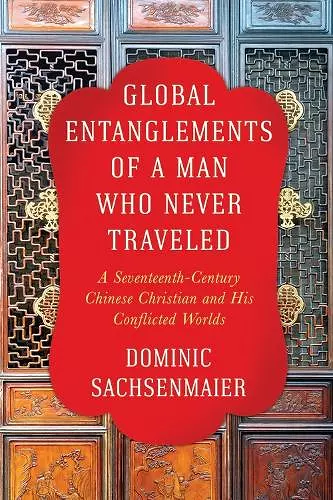Global Entanglements of a Man Who Never Traveled
A Seventeenth-Century Chinese Christian and His Conflicted Worlds
Format:Paperback
Publisher:Columbia University Press
Published:29th Sep '20
Currently unavailable, our supplier has not provided us a restock date

Born into a low-level literati family in the port city of Ningbo, the seventeenth-century Chinese Christian convert Zhu Zongyuan likely never left his home province. Yet Zhu nonetheless led a remarkably globally connected life. His relations with the outside world, ranging from scholarly activities to involvement with globalizing Catholicism, put him in contact with a complex and contradictory set of foreign and domestic forces.
In Global Entanglements of a Man Who Never Traveled, Dominic Sachsenmaier explores the mid-seventeenth-century world and the worldwide flows of ideas through the lens of Zhu‘s life, combining the local, regional, and global. Taking particular aspects of Zhu‘s multiple belongings as a starting point, Sachsenmaier analyzes the contexts that framed his worlds as he balanced a local life and his border-crossing faith. At the local level, the book pays attention to the intellectual, political, and social environments of late Ming and early Qing society, including Confucian learning and the Manchu conquest, questioning the role of ethnic and religious identities. At the global level, it considers how individuals like Zhu were situated within the history of organizations and power structures such as the Catholic Church and early modern empires amid larger transformations and encounters. A strikingly original work, this book is a major contribution to East Asian, transnational, and global history, with important implications for historical approaches and methodologies.
Global Entanglements of a Man Who Never Traveled is a mature work by a scholar who has reflected not only on the history of Christianity in China but also on the problem of cultural interactions in the early modern era. Sachsenmaier offers a significant departure from the tradition of Christian studies in China even while dealing with the question of Christianity as a faith. He explores the historical problem of self-formation and trans-formation—both individual and collective—and the organizational machinery of the Catholic Church during a period of momentous global encounters. -- Prasenjit Duara, Duke University
This book offers an engaging portrait of an "ordinary" Chinese of the seventeenth century who called himself Cosmas, and whose curiosity about the world beyond China drew him to Christianity. His Jesuit instructors may have thought they were accommodating Christian beliefs to Confucian China, but it was Cosmas and his Chinese friends who did the real work of making sense of Christianity from where they stood. -- Timothy Brook, University of British Columbia
This is a fascinating global analysis of a Chinese Catholic/Confucian literatus living in the seventeenth century in Ningbo, a port city in southeast China. The life and thoughts of Zhu Zongyuan, who never traveled to distant places and who was not the most prominent Catholic in his lifetime, nevertheless evince the converging of Catholic knowledge and ideas, Confucian tradition, and the cultural complexity and diversity of Ningbo. Sachsenmaier analyzes the internal tensions, contradictions, and unique strategies inherent in a man entangled in global history and local tradition. This book contributes substantially to both Chinese intellectual history and the rising field of global history. -- Wang Hui, Tsinghua University, Beijing
Sachsenmaier’s pioneering study of one Chinese Christian’s impact upon the global religious tableau of intercultural misunderstanding, conversation, and amalgamation is especially welcome because he has brought a largely forgotten and overlooked voice into the larger dialogue of scholarly interest in Sino-Christian exchange. . . . This is a valuable book for better understanding the value of ‘marginal’ voices during a time in global history when the world’s margins were being slowly erased. * Journal of Chinese Religions *
The Columbia Series in International and Global History, to this reviewer’s mind at least, is one of the most original history publishing series going and Sachsenmaier’s short yet ambitious volume is a worthy addition. . . . Global Entanglements is an interesting and pleasurable read, dealing with highly complicated historical themes and doing so admirably. -- R. J. W. Mills * The Seventeenth Century *
Besides offering a timely and rich re-contextualization of the scholarship on the intersection of late Ming China and the Jesuit missions to the Far East, Sachsenmaier’s book is, quite simply, a joy to read. -- Mario Cams * Ming Studies *
The Global Entanglements of a Man Who Never Traveled is an exquisite and erudite work, all while being accessible and skillfully written and narrated: a must-have on syllabi of courses of Sino-Western relations, Chinese history, and history of global Christianity. * Journal of Jesuit Studies *
Global Entanglements is a thoughtful book based on twenty years of meditation. It is a distinguished contribution to scholarship that leads us to think in new ways about an isolated Christian literatus in seventeenth century China who although he never traveled, was transformed by his relationship with the rest of the world. * Monumenta Serica *
Sachsenmaier’s historiography is outstanding and will be meaningful to scholars and students in many academic fields, such as world Christianity, relations between China and the West, and religious studies. * Reading Religion *
An innovative book . . . Sachsenmaier achieves his goal of writing a book that weaves together ‘microscopic and macroscopic’ perspectives on this important encounter in early modern world history. * East Asian Journal of Popular Culture *
ISBN: 9780231187534
Dimensions: unknown
Weight: unknown
280 pages